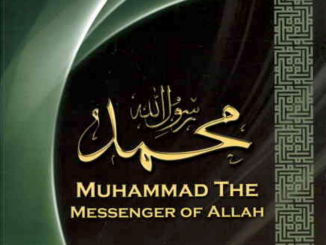
Piety and Fasting
Keeping in view these meanings of #piety, it is not difficult to understand that there
could have hardly been any other more effective prescription for creating this
quality than #fasting, standing in prayers during the night to recite the #Qur’an, and
that there could not have been more opportune time than Ramadhan to use this
prescription.
By combining in Ramadhan both fasting and #recitation of the Qur’an
during #prayers, #Allah has, in fact, opened up the way for us to attain #piety.
When we fast, we avoid fulfilling even our legitimate desires, such as hunger and
thirst, from dawn to dusk, just for the sake of #Allah; we forego our otherwise
legitimate urges for His bounty and reward.
When night falls, we stand up to hear
His Word and go through the entire #Qur’an at least once during the month’s time.
It is unfortunate that due to lack of knowledge of the Arabic language as well as
lack of hard work, we understand little – as to what Allah says to us, and what we
really hear.
Yet, the Divine scheme is quite elaborate: that we should become
acquainted with the guidance that #Allah has given us in the form of the #Qur’an.
Acting upon and calling others to it is our foremost duty.
#Recitation of the #Qur’an
gives knowledge and strengthens belief while fasting gives boost to the
determination of toiling for the sake of #Allah.
During #Ramadhan, we eat when Allah commands us to eat and we stop eating
when #Allah so asks.
Eating is not forbidden as such, but we consider fulfilling the
very basic needs forbidden, as a mark of our obedience to #Allah.
In normal times,
fulfilment of these needs is not just allowed but is an obligation.
In this way, we
inculcate the quality and strength to stop ourselves from every thing which #Allah
has asked us to avoid, no matter how intense may be our need or desire, and no
matter how good or desirable it may look to us.
#Fasting reinforces our #belief that the realities about which we have been given
information by #Allah and His #Prophet (pbuh) are not material and sensual but are
far more precious, invaluable and satisfying than the material and sensual urges
like hunger, thirst, and sex.
We do not live on bread only, but high #moral values are
a must for life.
This is how strength is produced inside us to forego and sacrifice
pleasures of this world that can be enjoyed here and today for the sake of higher
spiritual and moral objectives whose realisation takes time or even demands us to
wait till the Hereafter.
Fasting also reinforces the fact that the real thing is obedience to Allah.
It is Allah’s
Will alone that is the final authority to determine right and wrong.
Virtue and
reward lie neither in eating nor in abstaining from eating; it is neither in sleeping
nor in keeping awake.
Virtue and reward are contained in submission and
obedience to Allah.
When these strengths and sensibilities are produced, we, both individually and
collectively at the national level, become able to carry the trust of Qur’an.
This is
because only then the capability of giving priority to the accomplishment of
Qur’anic mission over material and sensual urges can be produced.
And this
capability is piety (taqwah).
Look at this from another angle.
Fast has no physical form: the hunger, thirst and
sexual urge can neither be seen by others, nor felt, nor can one fully share in the
feelings of others.
Then, there is no physical form of sacrificing these urges, either.
So, restraint from fulfilling corporal desires cannot be weighed in material terms.
Fasting rests on the firm belief of feeling oneself in the court of Allah.
Wherever
one may be, He is present – if there are two, He is the third one; if there is
someone alone, He is the second one.
He is nearer than the jugular vein. It is this
belief – the belief of one’s own presence in the court of Allah – which is the real
result of fasting.
That is why it has been told in a Hadith-Qudsi21: Fasting is for Me
alone, and only I can given the reward for it.22 Piety is founded on this belief, feeds
on this belief, and grows and develops on this belief.
Lastly, yet another important point! When Satan loses all hope of us giving up this
prescription that is so beneficial to us, he tries to lessen the benefit – that we
become content with taking only a few drops from the sea.
Fasting and prayers during the night can produce that high level of piety as we have just talked about,
but it can also be limited to producing that kind of piety that is concerned only
with minor acts of worship and rituals, which rather reverses the order of
priorities: giving priority to tertiary acts over the secondary, and giving priority to
the secondary over the primary and obligatory deeds.
Similarly, we become
content with giving up minor sins!
But, Allah’s scheme for inculcating piety through obligatory fasting has much more
meaning to it.
This piety enables us, as individuals and as a nation, to carry out the
mission of Qur’an – in such a way as is due.
It is necessary to know this because
many keep fasting during the day and remain awake during the night but fail to
take even a single step on the path which fasting and recitation of Qur’an want
them to take.
This is in spite of the fact that the most important of all good acts,
the most obligatory of all obligations, and the most beneficial of all benefits, is that
we act upon Qur’an and do our best to take others along the path of Qur’an and
try practically to do something for this cause.
We can truly realise the importance of this obligation when we have understood
the relationship between Qur’an, fasting in the month of Ramadhan and piety.
We should keep this in mind that the month of Ramadhan was selected for fasting
only because it was in this month that Qur’an was revealed.
The greatness and
blessing of this month lie in Allah’s decision to send His Guidance in it, and He
handed over the last piece of revelation to humanity through His Last Prophet.
The
purpose of enjoining fasting in this month is to produce that piety in ourselves that
generates strength and capability to uphold the Guidance contained in the Book.
21 In categorisation of Hadith, the Hadith-Qudsi is that Hadith in which Allah’s Prophet quotes Allah’s
statement as such.
22 Al-Bukhari and Al-Muslim, narrated by Abu Hurairah



